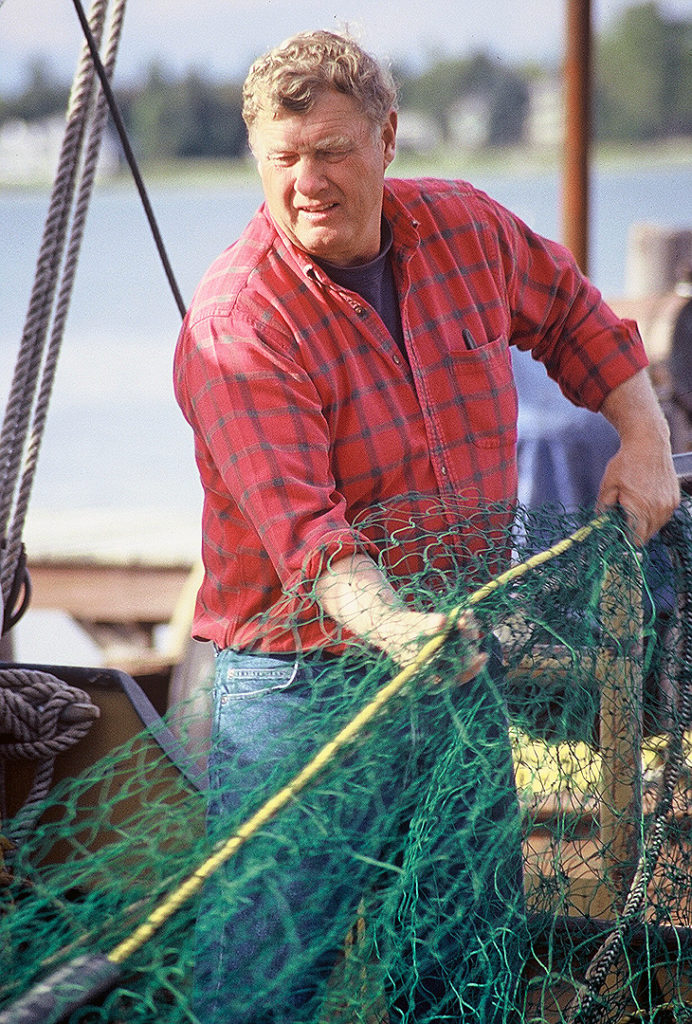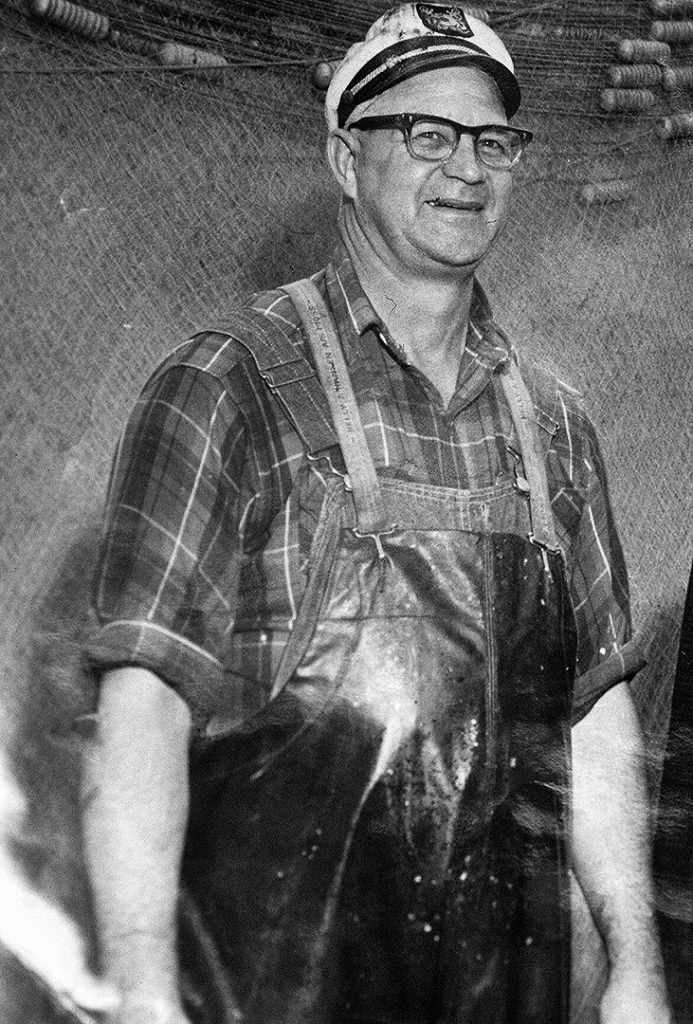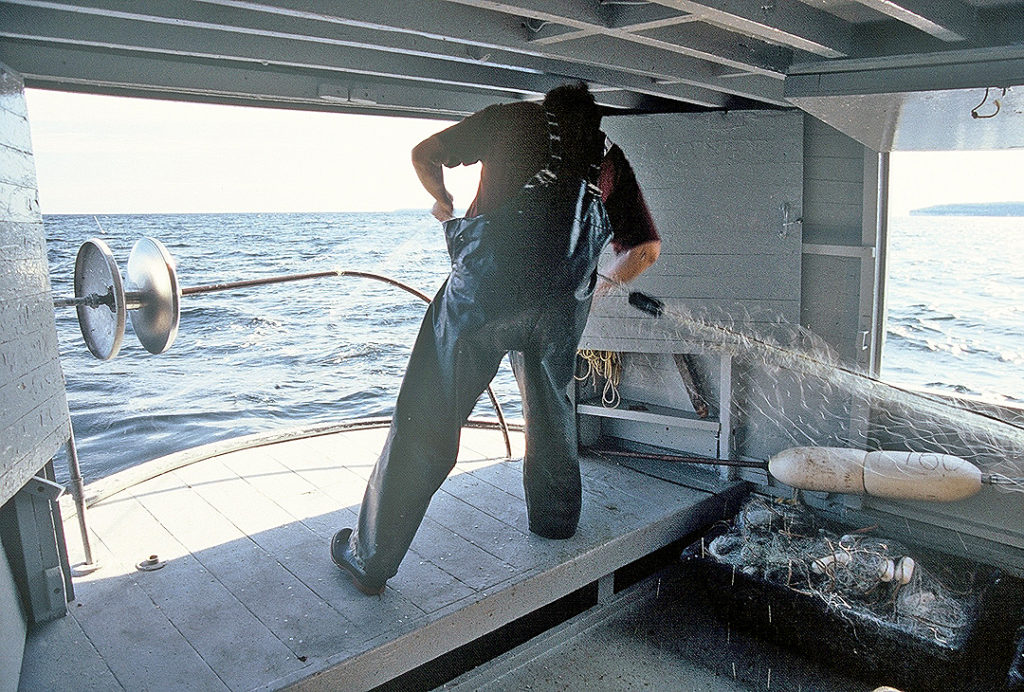by Trygvie Jensen
According to Gills Rock commercial fisherman Jeff Weborg, “One of the biggest misconceptions of a commercial fisherman is that he’s rich simply because when you get a good lift everyone seems to know about it, and therefore assumes your making a lot of money, but what they don’t realize or hear about is all those times your out there and never get any fish; or you go out there and your nets are lost or ruined; or you blow an engine in your boat. Nobody hears about that, but let me catch a few fish and they so, ‘oh look at the fish they got.’ So there’s some real misconception there.”
“I don’t like to quote the price of fish or the size of our investment,” said Dennis Hickey. “Some people can’t put things into perspective. We have a sizable investment in our operation. If I were to say I had ten trap nets at a certain dollar amount, some people might say, he must be making a lot of money — Yeah, if you work seven days a week, fourteen to sixteen hours a day, for a lifetime you can have that. You have to be careful what you say — I’ve seen in the past, how that all works. It’s the same with farmers; people see a farmer with three or four harvester silos, a nice big red barn, a bunch of cattle, they don’t realize the poor bugger is out there until 9:00 or 10:00 o’ clock in the evening and out there at 4:00 in the morning.”
“One of the biggest misconceptions about commercial fishermen, I noticed,” said commercial fisherman Neil Teskie, “Is that we don’t care about the fish. People think that we’re just out there raping the lakes, so-to-speak. Not caring about the stocks. People don’t understand that we understand that without those fish we don’t have anything.
We’re more conservative or conservationists than what people think and I think the biggest misconception is that we’ve destroyed the stocks and are destroyers. We’re the first to say if the stocks are in jeopardy, I’ll be the first to say, ‘cut my quota.’ If I think the stocks are in jeopardy. Sometimes the jeopardy is more people management than fish management.”
The late Marvin Weborg, a commercial fisherman from Gills Rock, who spent nearly his entire life as a commercial fisherman as did his father gave his perspective: “I fished probably fifty-five or sixty-five years at least. With the kind of boats we’ve had, I’ve fished gill nets, pound nets, trap nets, hooks, and any herring nets, floating herring nets, pound nets for herring, and all the rest of it. I’ve had a good life as far as fishing is concerned. We’ve caught an awful lot of fish; I’ve enjoyed it — the fresh air. I’ve never been afraid to be on the water and the winds — you might as well stay there once you’re out there, because the winds are just as bad. The time you get the worst ride is going out or coming in, when you’re traveling any speed. As far as lifting is concerned, we’ve had waves take and throw the roller when we were lifting nets and throw it right back into the boat, and the water land right through the lifter door on the other side of the boat. Put it back out there, and keep right on lifting, I’d say. Sometimes the nets have snapped right off, if we had to go to the other end or grapple them up. Of course, on an occasion like that you don’t stay there anymore, you head for home.”
To learn more about the commercial fishery industry that sustained many communities around Lake Michigan and Door County for more than 150 years, pick up a copy of Wooden Boats and Iron Men by Trygvie Jensen. You’ll read about the people and communities upon which the commercial fisheries made an impact as well as the rise and fall of an industry in a once great era when iron men fished in their wooden boats.
Author Trygvie Jensen’s acclaimed Wooden Boats & Iron Men will take you back to a place and time when the commercial fishery was the major industry at Washington Island and Door County. Read about one of the oldest professions known to man; in which the industry has survived for nearly two hundred years on the Great Lakes. Commercial fishermen are the living past, confronting an uncertain future. This book will take you back in time and show how the fisheries were an integral part of the Door peninsula and Washington Island communities, and will give the reader an inside look at how a fishery operates. (http://woodenboatsironmen.com)





 ALL CONTENT © 2024 BY DOOR GUIDE PUBLISHING
ALL CONTENT © 2024 BY DOOR GUIDE PUBLISHING




